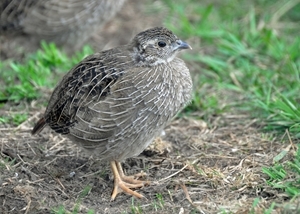 Following the disastrous breeding season for wild grey partridges last summer, which was reportedly the wettest for 100 years and fatal for countless young partridges, leading research charity the Game & Wildlife Conservation Trust (GWCT) is maximising efforts to help the recovery of this iconic species.
Following the disastrous breeding season for wild grey partridges last summer, which was reportedly the wettest for 100 years and fatal for countless young partridges, leading research charity the Game & Wildlife Conservation Trust (GWCT) is maximising efforts to help the recovery of this iconic species.
In the UK, numbers of grey partridges have declined by over 80% during the last 25 years and the poor breeding in 2012 was a further set-back to their recovery. To boost numbers, the GWCT is encouraging landowners, farmers and gamekeepers to re-establish partridge populations where they have become locally extinct or have fallen below self-sustainable levels.
To support those wishing to attempt a re-establishment programme, GWCT Advisory Service are running a number of unique training days this year. The training is based on a three-year research study initiated by the Trust, which investigated the most effective methods of re-establishing a partridge population through releasing and culminated in comprehensive guidelines for practioners.
The first training day is being held on 13th June at the National Agricultural Centre at Stoneleigh Park in Warwickshire.
Dr Francis Buner, the GWCT scientist who led the research project and is part of the training team, said, “There are now huge tracts of our countryside that no longer hold grey partridges, but despite being a notoriously difficult bird to re-establish our comprehensive guidelines and this training will show the art of the possible.
“Re-establishing a wild population where they are no longer present is certainly not for the faint-hearted, but once the right habitats have been created and feeding and predator control are being maintained, we feel confident that many people will be able to have wild partridges on their land again.”
The training day will involve a combination of presentations and practical sessions. This in-depth course is designed to help clarify and guide people through some of the pitfalls and will offer lots of tips and encouragement to help ensure a positive and successful outcome.
In any re-introduction project, attention to detail is paramount and the day will be run by both Roger Draycott and Dr Francis Buner from the Trust as well as Dr David Butler, a gamebird biologist from Perdix Wildlife, who specialise in rearing grey partridges for re-introduction programmes.
Dr Roger Draycott said, “This course is relevant to everyone interested in grey partridge conservation, from farms or conservation groups looking to re-establish a small but viable resident population on their land to game managers whose ultimate goal is to achieve a sustainable wild grey partridge shoot.”
The one-day course on the 13th June costs £66 per person including lunch and can be booked by contacting Lynda Ferguson on 01425 651013 or email: lferguson@gwct.org.uk. Alternatively book online: www.gwct.org.uk/courses.
END
Photocaption: Wild grey partridge suffered huge chick losses last year because of the appalling weather. Where they are now locally extinct, the Game & Wildlife Conservation Trust is offering training to help re-establish new populations. Pictured is a young grey partridge poult.
Photocredit: Peter Thompson.
Notes to editors
The Game & Wildlife Conservation Trust – providing research-led conservation for a thriving countryside. The GWCT is an independent wildlife conservation charity which has carried out scientific research into Britain’s game and wildlife since the 1930s. We advise farmers and landowners on improving wildlife habitats. We employ more than 60 post-doctoral scientists and other research staff with expertise in areas such as birds, insects, mammals, farming, fish and statistics. We undertake our own research as well as projects funded by contract and grant-aid from government and private bodies.
For information, contact:
Eleanor Williams
Telephone: 07592 025476
Email: press@gwct.org.uk